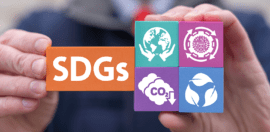Looking to the future of shared value

29 March 2023 at 2:17 pm
Shared value has been around for roughly 12 years. Where is Australia at with the nebulous concept?
Twelve years on from the introduction of the concept of shared value, Emma Watton from Shared Value Project told Pro Bono News that Australia is in a good place for shared value.
The job of convincing businesses that they need to do things differently is largely done, she said; the job now is about how shared value is enacted.
“We see really important things coming through the system, like impact-weighted accounts, which allow an organisation to start to understand on their balance sheet what these different initiatives do for their business as well as for society,” Watton said.
“We’re getting much more into the action stages now. We’re certainly not there, and there is a big cliff of environmental action that needs to happen very fast. But we now have the ability to measure [the impact of businesses].”
She said businesses should be “on the front foot” of tackling inequality, inequity and exclusion in society, because the negative impacts of those issues if they are not adequately dealt with will be bitterly felt by businesses.
What does shared value mean?
Since the term ‘shared value’ was coined, many businesses have begun the pivot needed to consider their environmental and social impacts.
And yet the term may still cause confusion as businesses navigate the dictionary of terms related to good business practices
But according to Watton, shared value has some things in common with other aspects of good business, like ESG, social enterprises and social procurement.
“Shared value is that strategic lens of how your business makes money… looking at those things that strategically will shift the needle in the environmental or social space and shift the needle of your business at the same time,” Watton explained.
It involves changing the things that are material to your business, to have a stronger, more positive impact on environmental and social issues. And while the language around that has shifted, the key concept remains the same.
“We use a lot more language now, like ‘regenerative capitalism’, ‘better business for a better world’, and these kinds of phrases where we’re not the least bit worried about whether people use the phrase ‘shared value’,” Watton said.
“The concept that sits at the heart of it, of how you create value for an organisation and shareholders as well as value for the world as a fundamental idea has not shifted.”
See more: 10 years of shared value: have we come far enough?
But isn’t that the same as…
Watton differentiates between shared value and businesses engaging in philanthropic spending.
“Philanthropic spend… is a really important thing, but it is more about just the good you want to see in the world, not how your business creates good in the world through its way of doing business,” she said.
“Where shared value comes [in is]… you create value for the organisation, and you create societal value in the process as well.”
See more: Look how far we’ve come – CSR
How do I get started in shared value?
Leadership is vital to successful shared value, Watton said, a purpose should be the north star.
“If your purpose doesn’t help to tell you where your focus should be, then you probably need to be evolving your purpose,” Watton said.
Change doesn’t happen in silos, so shared value and purpose should be embedded across the business so everyone understands their role in creating positive impact.
And it won’t be easy, Watton warned. Implementing a pivot towards shared value is hard work.
“Your ability to change and your ability to have a shared culture and vision that people believe in is really critical,” she said.
The current economic crisis may initially sound like a tricky time to get started, but in fact, Watton said shared value has a role to play in the cost of living crisis by addressing the issues that customers are interested in.
“That’s exactly what you should be looking at when you’re in a time of economic tightening, is understanding how you drive value within the business. Having that strategic lens that looks at how the way we do business creates value for us and for society is actually the answer when times are tough,” she said.
“What mattered most [during the COVID pandemic] was actually people and connection. People didn’t stop spending with companies who are good community citizens who really understood people.”
What does the future hold for shared value?
Watton said Shared Value Project is feeling optimistic about the future of shared value.
Over the past decade, shared value has risen in prominence and Shared Value Project now sees part of its role as supporting and coaching people through the change in business approach.
Shared Value Project also sees an important role in the bringing together of government, corporates and not for profits to promote shared value.
“We want to make sure that the deep knowledge that sits in not for profits of what’s happening in communities and the micro-level understanding of programs and impact [is shared with] corporates to scale and fit that into their supply chain so that the positive impact can be amplified,” Watton said.
She believes the upcoming federal budget, which is likely to include more of a focus on wellbeing, could prompt more businesses to see beyond ESG and risk and step into the opportunities available.
Watton said businesses should take an issue — loneliness, hunger, valuing ageing, for example — and ask what role it can play in solving the issue.
And they’d better get in quick, because these problems are pressing.
“There’s a lot of creative energy needed by organisations… I know people are exhausted by change [but] there’s no relaxing,” Watton said.








